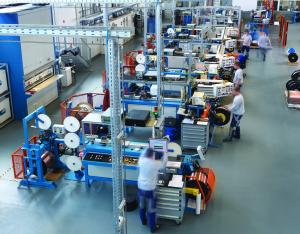Europe completes niobium-tin strand production
24 Oct 2014
The final inspection on the completed wire at an eddy current test station at Bruker EAS, in Germany. (Photo courtesy of Bruker EAS GmbH.)
The European Domestic Agency has announced the realization of an important procurement milestone for ITER: the completion of Europe's share of the niobium-tin (Nb3Sn) superconducting strand required for the fabrication of ITER's powerful toroidal field coils.
Approximately 380 tonnes of Nb3Sn superconducting strand, or "wire," is required for ITER's toroidal field magnets. The wire is the key component that will allow the toroidal field magnets to reach 12 T and contribute to the confinement of the plasma. Each strand is less than 1 mm in diameter, and yet can sustain very high current when cooled down to "superconducting" temperatures (-269 degrees Celsius).
The European share of toroidal field strand procurement amounts to 97 tonnes (20.2 percent of toroidal field strands). Two suppliers—Bruker European Advanced Superconductors and Oxford Superconducting Technology—carried out the fabrication. The superconducting wire was produced, tested, approved by the European Domestic Agency, Fusion for Energy, and finally cleared by the ITER Organization.
Europe is the third ITER Domestic Agency, after Korea and Japan, to complete toroidal field strand production and all related ITER Organization control points.
The more than 1,500 production units produced by the two manufacturers will be used to fabricate the cables for the European toroidal field coil cable-in-conduit conductor (CICC) lengths.
Fifty percent of conductor unit lengths have already been produced and delivered to ASG Superconductors SpA, the Italian facility in charge of manufacturing the toroidal field coil winding packs. The remaining conductor lengths will be finalized in 2015.


